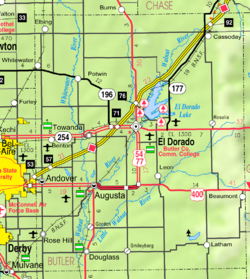Elbing, Kansas
| Elbing, Kansas | |
|---|---|
| City | |
 Location within Butler County and Kansas |
|
 KDOT map of Butler County (legend) |
|
| Coordinates: 38°3′15″N 97°7′38″W / 38.05417°N 97.12722°WCoordinates: 38°3′15″N 97°7′38″W / 38.05417°N 97.12722°W | |
| Country | United States |
| State | Kansas |
| County | Butler |
| Platted | 1887 |
| Government | |
| • Type | Mayor–Council |
| • Mayor | Bruce Janzen |
| • City Clerk | Marsha Clark |
| Area | |
| • Total | 0.19 sq mi (0.49 km2) |
| • Land | 0.19 sq mi (0.49 km2) |
| • Water | 0 sq mi (0 km2) |
| Elevation | 1,440 ft (439 m) |
| Population (2010) | |
| • Total | 229 |
| • Estimate (2015) | 228 |
| • Density | 1,200/sq mi (470/km2) |
| Time zone | CST (UTC-6) |
| • Summer (DST) | CDT (UTC-5) |
| ZIP code | 67041 |
| Area code | 316 |
| FIPS code | 20-20050 |
| GNIS feature ID | 0478025 |
| Website | ElbingKS.com |
Elbing is a city in Butler County, Kansas, United States. It is named after the city Elbląg (German: Elbing) in northern Poland, formerly Prussia. As of the 2010 census, the city population was 229.
For many millennia, the Great Plains of North America was inhabited by nomadic Native Americans. From the 16th century to 18th century, the Kingdom of France claimed ownership of large parts of North America. In 1762, after the French and Indian War, France secretly ceded New France to Spain, per the Treaty of Fontainebleau.
In 1802, Spain returned most of the land to France. In 1803, most of the land for modern day Kansas was acquired by the United States from France as part of the 828,000 square mile Louisiana Purchase for 2.83 cents per acre.
In 1854, the Kansas Territory was organized, then in 1861 Kansas became the 34th U.S. state. In 1855, Butler County was established within the Kansas Territory, which included the land for modern day Elbing.
...
Wikipedia
